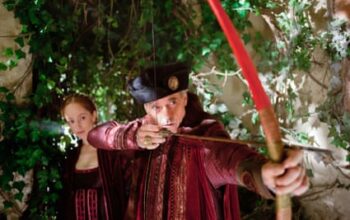Sandringham Road lies in the east of Cardiff; a quiet run of Edwardian terrace houses overlooking Roath Mill Gardens. On a late July day, when the air is warm and the park spills out over its railings, Toby Jones and Harry Lawtey sit on the pavement, wearing matching striped pyjamas. The pair are some way into the filming of Mr Burton, an account of the early life of Richard Burton. Lawtey plays the actor in his younger years, when he was known as Richard Jenkins, and Jones is Philip Burton, the teacher who fostered his young student’s talent. So close would their bond grow that Jenkins would become Burton’s legal ward and take his surname. “Without Philip Burton there would never have been a Richard Burton,” Elizabeth Taylor once wrote. “That great rolling voice that cracked like wild Atlantic waves would never have been heard outside the valley.”
Having starred in three series of the HBO drama Industry as an Oxford graduate from a working-class Welsh background – much as Burton himself had been – Lawtey makes a smart casting. He is, too, a young star in ascendance, diligent and eager to learn, in touch with the thrill of his own potential.
Jones, meanwhile, wears his status as one of the country’s finest actors with a kind of gentleness. His work across three decades, from Mike Leigh’s Naked to Marvel’s Captain America, via Uncle Vanya and Detectorists, has shown him to be an actor of both instinct and intellect, meticulous and nuanced, and beautiful to watch. His 2024 role as Alan Bates in ITV’s crusading drama Mr Bates vs the Post Office raised his profile considerably; playing the wrongfully convicted post office operator with muted heroism. He brings a similar quiet determination to the role of Philip Burton, a man whose own trajectory as a scriptwriter and actor took some time to gather pace, and who invested heavily in the talents of his young charge.
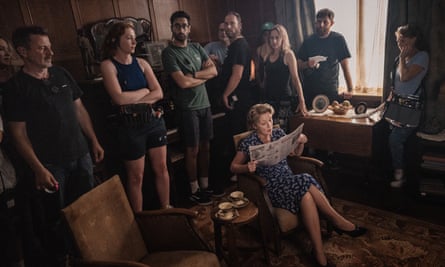
There’s a tenderness between the pair as they sit on their folding chairs in the sunshine today. An echo of that Jenkins and Burton dynamic, perhaps, but also the particular magnetism of two actors in the draw of creating something together. This morning they are shooting an interior scene. A house on Sandringham Road has been repurposed as 6 Connaught Street, Port Talbot, where Philip Burton lodged while teaching English at the nearby secondary school, and where Richard, too, would come to live. The crew – complete with cameras, microphones, director and producer – have crammed into a small bedroom, crouching behind the bed and pressed up beside wardrobes.
It is a delicate scene, but crucial. Opening with Richard discovering that his teacher has submitted a play to a theatrical agent and been rejected, it is the point in the film when the balance in the pair’s relationship shifts – the mentee now bolstering his mentor. It ends with Richard standing in the doorway, delivering the prologue from Henry V – a performance only slightly undermined by the fact he is wearing his nightclothes.
It is hard to overestimate the importance of Richard Burton in Welsh culture. A miner’s son from the Afan valley who became one of the best-known actors in the world, his name is given to the theatre at the Royal Welsh College of Music and Drama in Cardiff, while the Richard Burton Archives, including his personal diaries, are housed at Swansea University. In Port Talbot, where Burton appeared in some of his earliest school productions, there is a monument featuring a poem the actor wrote about his childhood in Wales (“The mountain earth feels damp against my hand …” it begins).
Still, even before his death in 1984, the myth of Burton had perhaps come to eclipse the extraordinary truth of both his talent and his story. His gift has been boiled down to a kind of theatrical caricature of his voice, and he is arguably remembered as much for the two marriages to Elizabeth Taylor, the lavish spending, the heavy drinking, as for his turn as Hamlet. As he himself once put it: “The public is not interested much in me as an actor. It is interested in the diabolically famous Richard Burton.”
“Richard Burton existed more as a cultural icon to us in Wales, not really as a familiar actor,” agrees Mr Burton’s director, Marc Evans. “He had the same sort of allure as, say, a George Best. But whereas the genius of Best was easily visible, the work of Burton was not much known to me or much seen by my generation. I didn’t grow up knowing his work and his genius is elusive on film. You have to look for it in dark corners. It was the voice we knew and felt we owned.”
In fact, the Mr Burton project began with the voice. The script is a collaboration between the Welsh writer Tom Bullough and Josh Hyams, producer of the long-running series The Trip, starring Steve Coogan and Rob Brydon. Hyams had grown accustomed to Brydon, from Baglan, near Port Talbot, slipping into an impression of Burton, his voice suddenly falling bone-deep and rich. “It made me think about how wonderful a voice it is,” Hyams says. “I went back and listened to the legendary recordings of Richard – particularly Under Milk Wood, and to watch his films. When I read about his background, what I learned was a real surprise.”
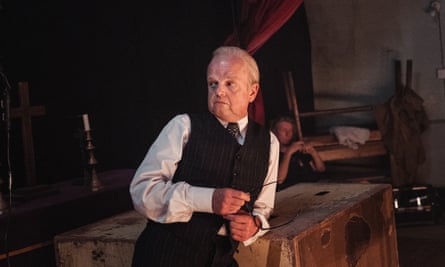
When he was interviewed by Michael Parkinson in 1974, Burton spoke of his voice. “It is the deep dark answer from the valleys to everybody,” he said. “I can’t help the voice, it’s part of me, I didn’t cultivate it or anything, it was given to me.” In many ways, Mr Burton is the story that gives the lie to the actor’s own account of this voice – telling of its cultivation by the young Jenkins and its gift by Philip Burton.
When Marc Evans approached Jones about the role, the development of the voice was an aspect of Burton’s story that appealed. “What spoke to me was that tradition of actors learning to lose their accent,” he says. “My father [the actor Freddie Jones] had to lose his voice from the Potteries, and he did it through learning tracts of poetry, for the sheer love, the romantic bewitching of the words.”
Philip Burton developed various ways to encourage the projection and resonance of Richard’s voice – most notably by practising on Margam Mountain, near Port Talbot. For the role, Jones drew on his own experiences of working with Penny Dyer, who has been his voice coach throughout his career. “In a way, the voice coach for you is the one whose analogies you respond to in the mouth and in the body,” he says.
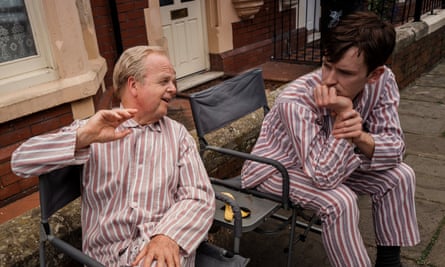
The body is particularly important to Jones, who attended the Jacques Lecoq school of physical theatre in Paris. “I learned that if you can’t tell a story with your body, then words become necessary,” he says. In Mr Burton, it brings an interesting tension – a character concerned with the cultivation of a voice, played by an actor who speaks primarily with the body.
after newsletter promotion
Lawtey, meanwhile, had the peculiar task of developing Burton’s voice on screen. “There are times in the film where I, an Englishman, am playing a Welshman doing an English accent badly,” he says. “And I can’t do my voice badly. Even when I get to what would be recognised as an RP accent, that still can’t sound like me. It would have to sound detached from me, because it’s Richard. And Richard’s voice is just entirely bespoke.”
Lawtey, too, worked with a voice coach, and watched hours of footage of Burton. “I started at the end of his career, and moved back to his earliest work, because I thought the earlier work would be most pertinent, and that’s where I wanted to come in to land,” he says. “I really did do a deep dive. Every now and then someone will send me a YouTube clip of Burton, as if I haven’t seen every single one.”
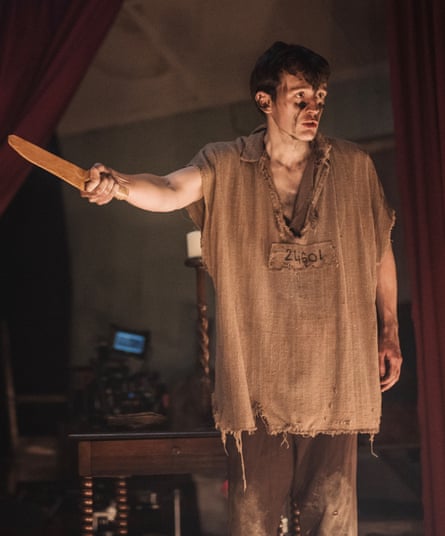
By his own account, Lawtey had become “mildly obsessed” with Burton after seeing Jack Thorne’s The Motive and the Cue towards the end of 2023. The play revolves round a 1964 production of Hamlet starring Burton and directed by John Gielgud, and Lawtey sought out footage of the original production on YouTube. “The technique is so strident but grounded,” he says. “You can tell he’s playing jazz with it. Maybe jazz meets punk.”
About a month later, by sheer coincidence, Lawtey was sent a speculative script for Mr Burton. “It said it was about someone called Richard Jenkins,” he says. “And I didn’t know that was Richard Burton until about halfway through. I just thought it was this lovely madeup story about this young Welsh kid who wanted to be an actor.”
When he won the part, he embarked upon what he describes as “an incredible fact-finding mission, which was pretty comprehensive on my part, and to be honest just a joy. There’s a burden of responsibility in doing something like this, which I certainly felt, but I relished it. I loved learning about him.” He describes Burton’s diaries as “my north star in terms of getting to know him and feeling familiar and close to him”.
Gradually, Burton shifted in Lawtey’s imagination from a name with which he was familiar into someone with whom he felt great kinship, and an actor he found compelling and inspiring. “There were times I would watch Richard’s work in preparation for this film where I just got it,” he says. “It just feels like he’s burning on screen. Like there’s this presence or aura or light round him, and he’s so invigorating and propulsive and aggressive but also vulnerable at the same time.”
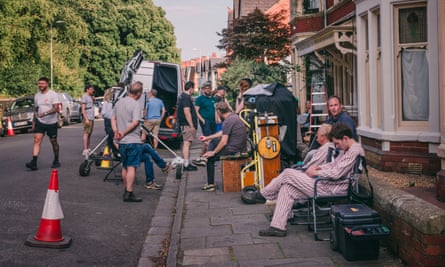
The following morning, the film crew have relocated to St Augustine’s in Rumney, dressing the church hall to replicate Port Talbot YMCA, where Philip Burton would direct amateur productions, and where Richard first performed on stage. The room is cool and dimly lit, a respite from the day’s heat. Outside, in their heavy suits and tea dresses, the extras prowl the gardens, trying to find shade.
Watching today is Kate Burton, Richard Burton’s daughter, also an actor. To see Lawtey playing her father as a young man has been “an out-of-body experience”, she says. Hitherto, she has avoided dramatisations of Burton’s life, but this production felt different. “I was intrigued about this one because the story focused on Dad as a very young man, and Grandpa” – as she refers to Philip Burton – “coming into his life,” she says. “I thought that was such an important story, and integral to Dad becoming Dad.”
Beyond the green velvet curtains, the extras fall quiet, the children cease fidgeting and a stillness settles over the hall. Lawtey, in Jenkins’ role as a convict, takes to the stage wearing a ragged overcoat. He has stage-paint daubed across his face to resemble dirt, and he wields a wooden knife. “If you call out, you are a dead man!” His opening line is delivered with unexpected fervour, but slowly he finds his pitch; force becomes desperation, his words grow real and resonant. “I have a wolf inside me,” he says, “tearing at my entrails, tearing me apart …” From the wings, Jones’s Mr Burton looks on; a small man, tightly held. But as his student speaks, something in him seems to give way; across his face moves revelation, wonder, pride. He lifts his eyes, meets his student’s gaze, and gives an almost imperceptible nod.
Mr Burton is in cinemas from 4 April.
Source: theguardian.com

